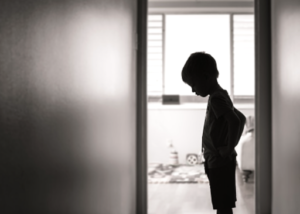Childhood Trauma and Language Development
Childhood Trauma and Language Development
With the escalating war in Ukraine, millions are fleeing their homes. As a result, families are being torn apart and children are experiencing traumatic events. This childhood trauma will impact language development in addition to the recent pandemic, disruption of not attending school, and moving to a country that speaks a different language.

The extent to which trauma impacts language development hasn’t been thoroughly researched. However, we do know that trauma changes the brain. Research has shown that persons who experienced early stress are more likely to have reduced volume in the hippocampus, which is central to memory (McCrory, De Brito, & Viding, 2010) and reduced volume in the orbital frontal cortex, which controls emotional regulation and decision making (Hanson et al., 2010). (Westby, 2018).
Signs of Childhood Trauma
Children who experience trauma may show a delay or disorder in the areas of expressive language (what they can communicate), receptive language (what they can comprehend), and/or social language (using language during social interactions).
Areas from the diagnostic criteria listed for PTSD (posttraumatic stress disorder) or DTD (developmental trauma disorder) in the Diagnostic and Statistical Manual of Mental Disorders (5th ed.; DSM-5; American Psychiatric Association, 2013) that could impact language development include, but not limited to:
- Persistent avoidance of activities, places, or physical reminders
- Avoidance of people, conversations, or interpersonal situations that arouse recollections
- Diminished interest or participation in significant activities such as play
- Socially withdrawn behavior
- Persistent reduction in expression of positive emotions
- Irritable, angry, or aggressive behavior, including extreme temper tantrums
- Problems with concentration
- Symptoms of emotional and physiological dysregulation/dissociation
- Problems with conduct and attention regulation
- Difficulties with self-esteem regulation and in managing social connections

Childhood Trauma and Impact on Language Development
With the brain changes and the characteristics listed above that lead to decreased social interactions (which leads to decreased language input and output), children who are exposed to trauma in early childhood, are at increased risk for a language delay or language disorder.
A Speech-Language Pathologist (SLP) can diagnose and treat language delays and disorders. It’s best if the SLP works with a team of other professionals who are skilled with childhood trauma, such as an art therapist, psychologist, social worker, or play therapist. Depending on your location and resources, access to professionals may vary.
Speech Therapy and Childhood Trauma
SLPs will work with victims of trauma throughout their careers. Here are things to do to help your clients.
Follow the child’s lead
Give the child a chance to be in control. Give them choices of what they can do in sessions. If that doesn’t work, give them space, and see what they gravitate towards. Then work your magic! Talk about their interests, narrate what you’re doing, or just talk to yourself and follow verbal or nonverbal cues from the child that indicate interest.
Use different forms of expression
We all want words and phrases but gestures, eye gaze, facial expressions, writing, and drawing are all forms of expression too. I’ve worked with kids who suffered trauma who were verbal but when they were overwhelmed, stopped talking. Letting them write down their thoughts/needs helped them get through that block. You may even need to think outside the box and let the child write with their finger instead of an actual pencil if that is what makes them comfortable.
Children may not explicitly request actions or items, even if they are verbal, but their nonverbals such as eye gaze or facial expressions may indicate their interests. Showing them that you are interested in what makes them happy, will build rapport, which leads to more interaction and therefore more communication.
Model vocabulary for emotions
With all kids, we should be labeling emotions as they come up. For example, if a child is happy and laughing, label those emotions and expressions (happy, excited, laughing, funny). You can say things like ‘you are so happy; I see you smiling.’ If the child is having a bad day, or a meltdown, help them label their feelings. Don’t judge or condemn their behavior, it’s ok to have those feelings. Talk about the vocabulary around those feelings and what to do about them. For example, you can say ‘you are upset right now, let’s take a break to feel better.’
Keep trying
There will be good days and bad days for you and the child (as well as the family). There may be several sessions in a row where you feel that you aren’t getting anywhere, and then you have a great session and see so much progress! Keep trying and roll with the punches.
Take care of yourself
Our clients experience a lot and that can take a toll on us as professionals. For me, most of the time I am able to separate emotions from my job. However, with the ones who were innocent victims, such as children who suffered abuse, it’s more difficult to stay positive. This is where self-care comes in. Talk to coworkers about how you are feeling (they probably feel the same way but remember to always abide by HIPAA), talk to your own counselor, or do something for you like getting a pedicure and happy hour with friends. Take care of yourself and know that you are making a difference! Those ‘little’ things like a smile, first word, or spontaneous hug are why we do what we do 🙂

References
American Psychiatric Association. (2013). Diagnostic and statistical manual of mental disorders (5th ed.). Arlington, VA: American Psychiatric Publishing.
Evans, Karen. (2018, March 12). On Trauma and Language Development. https://www.theinformedslp.com/review/on-trauma-and-language-development
Hanson, J. L., Chung, M. K., Avants, B. B., Shirtcliff, E. A., Gee, J. C., Davidson, R. J., Pollak, S. D. (2010). Early stress is associated with alterations in the orbitofrontal cortex: A tensor-based morphometry investigation of brain structure and behavioral risk. Journal of Neuroscience, 30, 7466–7472.
McCrory, E., De Brito, S. A., Viding, E. (2010). Research review: The neurobiology and genetics of maltreatment and adversity. Journal of Psychology and Psychiatry, 51, 1079–1095.
Westby, Carol. (2018, September 6). Adverse Childhood Experiences: What Speech-Language Pathologists Need to Know. https://journals.sagepub.com/doi/full/10.1177/1048395018796520

One Comment